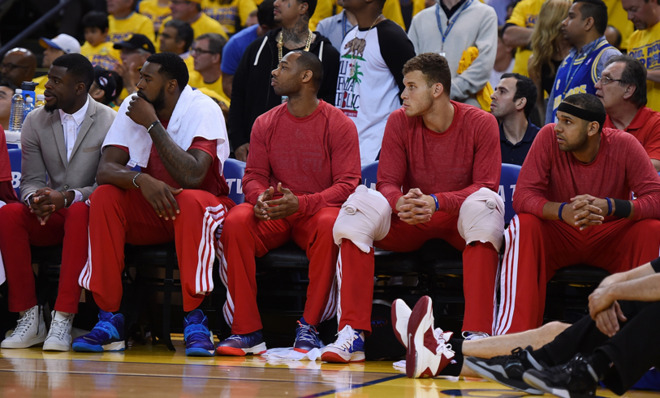Adam Silver just showed why a Clippers boycott was unnecessary
The league just nuked Donald Sterling's ownership far more effectively than a player boycott would have


A free daily email with the biggest news stories of the day – and the best features from TheWeek.com
You are now subscribed
Your newsletter sign-up was successful
Making an emphatic statement, NBA Commissioner Adam Silver on Tuesday announced that the league has banned L.A. Clippers owner Donald Sterling for life and fined him $2.5 million for his racist remarks about black people.
Kudos to the league for finally doing something about Sterling. And in taking such decisive action, Silver and Co. showed why a player boycott — demanded by many fans and analysts — would have been toothless and misguided.
Before Sunday's Game 4 of the Clippers-Warriors first-round playoff series, the Clippers quietly protested Sterling by turning their warm-ups inside-out. Some complained that the act fell short, with various commentators, from Snoop Dogg to Keith Olbermann, calling for a walkout. Over at Slate, Aisha Harris called it "disappointing and lame," saying that "refusing to display your team's name means little when you're still making money for someone who holds both a position of power and racist, antiquated views."
The Week
Escape your echo chamber. Get the facts behind the news, plus analysis from multiple perspectives.

Sign up for The Week's Free Newsletters
From our morning news briefing to a weekly Good News Newsletter, get the best of The Week delivered directly to your inbox.
From our morning news briefing to a weekly Good News Newsletter, get the best of The Week delivered directly to your inbox.
This was a confused and unhelpful suggestion. First of all, there's a big problem with demanding that players bench themselves because of Sterling. I'm with SB Nation's Tom Ziller, who wrote, "It should never be up to victims of behavior to fix the problem."
And even if the Clippers had refused to suit up for their next playoff game, they wouldn't have hurt Sterling's bottom line in any meaningful way. Fans have already bought their tickets to the game. And thanks to the league's revenue sharing system, Sterling can pocket a whole lot of cash even if his team sits. The particulars of the new system are a bit tricky, but basically, there's a $200 million pool of money redistributed from teams with high revenues to those with less cash. A boycott that saps the Clippers of revenue could actually send more league money into Sterling's pockets.
It's hard to imagine Sterling getting worked up over a lousy product — or no product — on the court so long as the dough continued to roll in.
Indeed, since buying the Clippers in 1981, Sterling has shown a flagrant willingness to cut costs, trot out any old team, and reap free league money. In an infamous instance, he asked former coach Paul Silas to double as the team's trainer as a cost-saving measure.
A free daily email with the biggest news stories of the day – and the best features from TheWeek.com
In the end, all the sanctimonious bloviating over Sterling's recorded remarks elides the real problem: Sterling, enabled by the league, has been accepted for so long as a harmless coot, like a grandpa who doesn't get what's wrong with the word "colored." This is a guy who settled a multi-million dollar Justice Department lawsuit for keeping minorities out of apartments he owns, who thinks black people "stink" and attract vermin, and who drops N-bombs about his own players.
Sterling's racist remarks to his girlfriend are deplorable. But they pale in comparison to his history of degrading discrimination against minorities. The fact that people, the league included, are just now getting upset about a man who has for years exposed himself as a babbling racist is dispiriting.
It's encouraging, though, that the league has finally come down on Sterling's retrograde buffoonery in an attempt to force him from the sport for good. (Though Sterling is banned from participating in any league activities, the NBA's board of governors must still vote on whether he should be forced to sell the team, too.) If Sterling chooses to fight and cling to his team, then a boycott — which would include players, coaches, and other Clippers staff, as well as free agents refusing to even consider the team as a new destination — may make sense.
For now though, we shouldn't tsk-tsk the players for failing to protest the way we want them to protest. That the team will play on in spite of their horrible owner is itself a stark protest, a sign that they, not he, make the NBA.
Jon Terbush is an associate editor at TheWeek.com covering politics, sports, and other things he finds interesting. He has previously written for Talking Points Memo, Raw Story, and Business Insider.
-
 The 8 best TV shows of the 1960s
The 8 best TV shows of the 1960sThe standout shows of this decade take viewers from outer space to the Wild West
-
 Microdramas are booming
Microdramas are boomingUnder the radar Scroll to watch a whole movie
-
 The Olympic timekeepers keeping the Games on track
The Olympic timekeepers keeping the Games on trackUnder the Radar Swiss watchmaking giant Omega has been at the finish line of every Olympic Games for nearly 100 years
